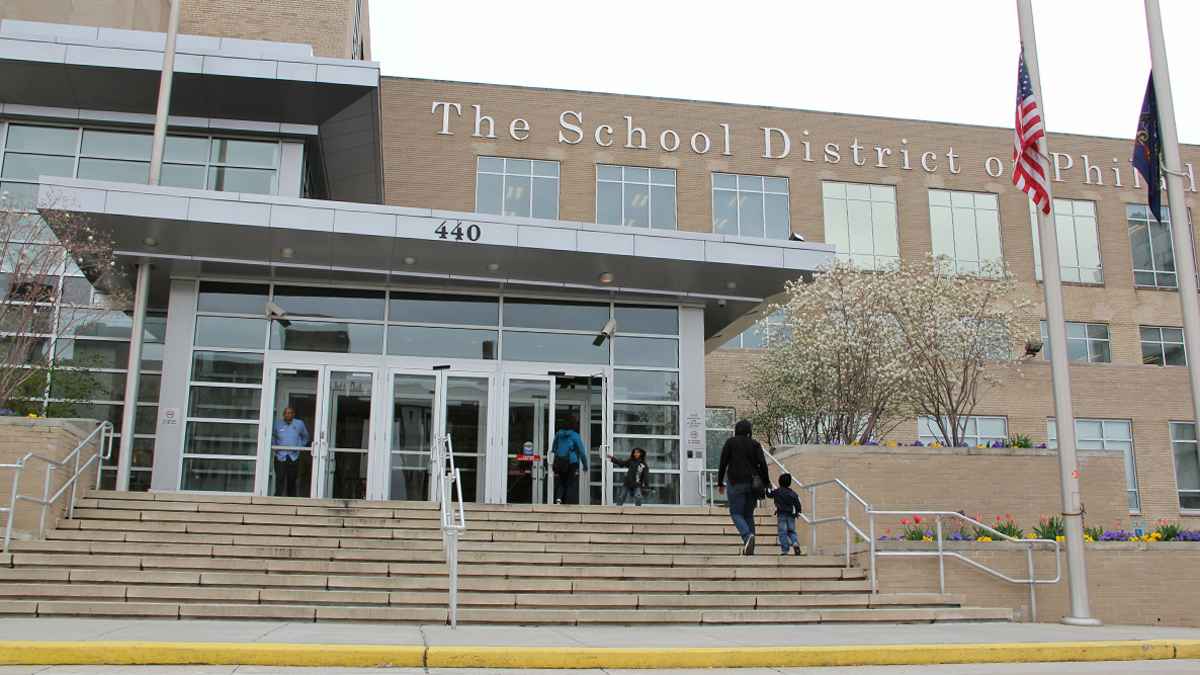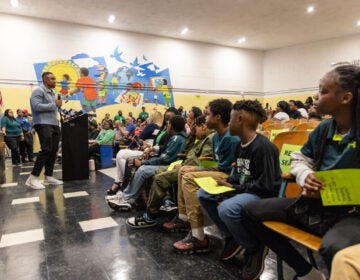Despite objections, Philly SRC approves new teacher prep program to boost diversity

Philadelphia School District headquarters at Broad and Spring Garden streets. (Emma Lee/for NewsWorks)
Sometimes it’s the smallest contracts that can raise the biggest stink.
Philadelphia’s School Reform Commission on Thursday approved a one-year, $150,000 contract for a teacher residency program run by the Relay Graduate School of Education. The contract covers tuition and fees for 20 teacher-residents who will work in Philadelphia schools beginning in the fall. While learning on the job, the teachers-residents will earn master’s degrees and earn their certifications.
The program is an alternative to traditional teacher preparation programs, which are typically run through universities.
Relay was one of five bidders — along with the Temple University, Drexel University, New York University, and the University of Pennsylvania — who responded to a school-district request for training programs that would increase teacher diversity.
“One of the challenges were trying to tackle is the lack of diversity in the incoming teaching ranks,” said SRC chair Joyce Wilkerson. “Part of the reason we’re pursuing this is part of a strategy for enhancing diversity.”
Relay, however, is a perennial target of public school activists who question its methods and effectiveness. Last year, Relay withdrew its attempt to establish an independent school in Pennsylvania that would grant master’s degrees to its graduates. Teacher-residents covered by the Philadelphia grant will technically earn their master’s degrees in New Jersey.
A trio of charter schools helped found the antecedent to Relay in 2007. At the moment, Relay has teacher-residents placed at number of Philadelphia charter schools including Mastery, KIPP, and Uncommon Schools, according to Shemanne Davis, dean of Relay’s Philadelphia-Camden campus.
The program’s ties to the charter movement have drawn some activists’ ire.
“They are a phony school made up by the privatizers,” said advocate and frequent education-reform critic Rich Migliore. “Don’t get involved with them, please.”
Others at Thursday’s SRC hearing, public commenters said Relay’s programs lacked the structure and intensity of traditional preparation programs.
But Davis vigorously denied that claim.
“It takes a lot of work to become a classroom teacher in urban areas,” she said. “It’s extremely rigorous. We invite anyone to come see our program.”
Philadelphia Superintendent William Hite defended Relay by noting that it is approved to certify teachers in Pennsylvania even if it does not have a stand-alone master’s program. Relay also has a stellar track record of recruiting and producing teachers of color, Hite said. Nearly three quarters of teacher-residents at Relay’s Philadelphia-Camden location identify as teachers of color, Hite said.
“If in fact this works we hope that over 5 years [Relay] could produce about 100 teachers for us,” Hite said. “And if 73 percent of them are teachers of color then we would have gone a long ways to accomplish many of our diversity goals.”
Davis, meanwhile, said traditional higher education preparation programs are not doing a sufficient job recruiting and training minority teachers.
“The hallmark of our program is getting teachers who look like our children,” she said.
Relay’s teacher-resident program is specifically aimed at training teachers for urban school districts. The program emphasizes real-world experience and “deliberate practice–a focus on the concrete and specific teaching skills necessary to maximize impact in the classroom,” according to Relay’s website.
Three of the SRC’s four members voted to approve the Relay contract. Commissioner Christopher McGinley was the lone “no” vote.
The commission also established a new policy committee Thursday aimed at increasing transparency by giving both SRC members and members of the public a forum to discuss upcoming policy changes.
Policies discussed at this new committee will be either passed along to the full SRC for a vote or held back for further deliberation. The SRC hopes this new committee will give the public a chance to comment on major changes before they’re given a final, up-down vote.
The first meeting of this new committee will be the morning of April 9 at district headquarters.
WHYY is your source for fact-based, in-depth journalism and information. As a nonprofit organization, we rely on financial support from readers like you. Please give today.





